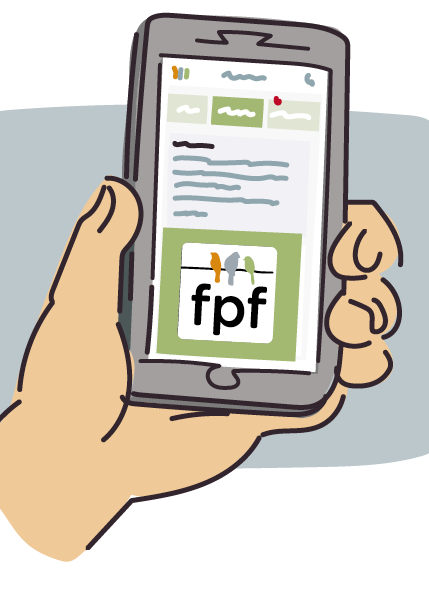Category Archives: Social Media
Growing Numbers of Vermonters Turn to Front Porch Forum
More than 230,000 Vermonters participate on their local Front Porch Forum as of October 1, 2023! And this is in a state with only 270,000 households. More people use FPF in Vermont than Facebook or any other Big Tech form of social media. See what members recently had to say about FPF…
• “I received so many tips for a walker after surgery. Thank you! I love FPF!“ – Bernadette in Randolph
• “Thanks to wonderful neighbors and FPF my stolen items were recovered from some bushes elsewhere in the neighborhood. I’m so very grateful!” – Cheyanne in Burlington
• “I just wanted to let all those who responded to offer homes to our overgrown [houseplant] beauties that they found a new plant parent! It would take too long to email all of you, but thanks for your interest and I’ll post again if we have more available in the future. Another example of how FPF is so great!“ – Anne in Westford
FPF’s mission is to help neighbors connect and build community. To join your local Forum, go to FrontPorchForum.com and register.
In addition to your local online Forum, check out your local Business Directory, Community Calendar, and Search.
A Recipe for a Better Internet
What would the internet look like if it weren’t dominated by a few huge corporations? And is such an internet even possible? A few smart folks at the Initiative for Digital Public Infrastructure have some really interesting ideas about what a more humane and diverse internet might look like. In a short, highly readable paper called “The Three Legged Stool: A Manifesto for a Smaller, Denser Internet”, they outline a different world and explain how to make it happen.The “three legged stool” refers to the three core principles of a better internet:
- A “pluriverse” — as in, plural universe — in which the large platforms are complemented (and challenged) by a diversity of Very Small Online Platforms, or VSOPs. “Just as we do not exclusively gather in shopping malls in the physical world, Facebook, Twitter, and YouTube are not the right place for every community and conversation online,” they explain.
- A “loyal client” that allows people to follow, read, and post as they wish, across multiple platforms. They describe this as analogous to how your email client — whether you use Gmail, or Outlook, or something small like Hey — allows you to email anyone, regardless of what email client they use. And the “loyal” part means you get to both pick a client and adjust its settings to align with your own preferences.
- A “friendly neighborhood algorithm store” where VSOPs can pay a reasonable price to access capabilities that, at present, only the big guys can afford: things like recommender systems, spam detection, and anti-abuse tools. Just as small businesses have access to high-powered tools for accounting, payroll, and other core functions, small online platforms should be able to provide high-quality experiences without having to spend billions to develop it all from scratch.
Front Porch Forum is a strong believer in a diverse and people-centric internet. We’re pleased to be working towards that future in the company of smart and committed folks like these. Let’s build a better internet together!
Fixing Digital Public Spaces
Leslie Stebbins was quoted in a recent Salon article, “Our digital public spaces aren’t so healthy… Can we fix that?” (read full article here) that…
“Tech companies maintain that they cannot moderate online communities because that would jeopardize our right to free speech and because there is simply too much content flying across these networks to track. Both these issues are false flags. We now know that the core infrastructure of these platforms is intentionally designed to amplify vitriol and misinformation because this increases engagement, keeps us online longer, and provides tech companies with billions of dollars from ad revenue. It doesn’t have to be this way.“
Further, Stebbins adds, “We should focus on creating new spaces that have explicit civic goals and are designed for equity and social cohesion. Real-world communities need to be involved in intentionally designing their own local digital public spaces rather than leaving this work to global tech companies.”
Front Porch Forum gets a nice spotlight in the article…
“Front Porch Forum […] focuses on real world community building. It is the antithesis of Facebook, TikTok, and Twitter. Rather than try to keep users online, it strives to get people offline and more connected to their local Vermont neighbors. Most people spend five or ten minutes a day online to get news that their neighbors have posted: lost dogs, bake sales and announcements of upcoming school board meetings. It is funded by donations and local ads based on where someone lives, but it does not track user behavior and advertising does not drive platform design.“
“Independent research on Front Porch [Forum] shows that it builds social cohesion and is improving the resilience of local Vermont communities. Building stronger community cohesion produces many intangible benefits such as high civic engagement, more instances of neighbors helping neighbors, and lower crime rates.“
Another Shout Out to FPF in NY Times
Thanks to Jill who just posted on the Craftsbury Forum:
“I just came across this New York Times article recognizing the great job Front Porch Forum is doing with keeping Vermonters connected. I know my family and I are grateful for the network it provides.”

Solving Social Media’s ‘Local Paradox’
A new article in a Stanford University journal underscores various failures of Big Tech social media, and highlights Vermont’s own Front Porch Forum as a better way.
In the bowels of social media giants, like NextDoor and Facebook, live online spaces for local social networks to take hold (e.g., a neighborhood based Facebook group).
One might think a healthy form of social connection would come from these local online networks because they’re grounded in real-world relationships and physical space — you could literally bump into that posting’s author on your way to school drop off — but in practice, as this article points out, local social media can be even more toxic than global platforms. It’s dubbed the ‘local paradox‘.
The solution to this local paradox, they say, is to build networks that are values-driven, closely moderated, trusted, and local. Further, they share Front Porch Forum as a leading example.
A Kinder, Gentler Social Network
Big Tech and social media giants are under the microscope more than ever. Front Porch Forum continues to draw attention from news outlets as the more friendly alternative among sites that are meant to connect us.
Julia Angwin, Editor-in-Chief of The Markup, a popular publication investigating Big Tech, recently spoke with FPF’s co-founder Michael Wood-Lewis to learn more about how FPF keeps conversations neighborly and kind, while other social media sites seem to be losing civility.
Read the full interview here.
Healthy Social Media? Experts Weigh In
Vermont’s own example of “Small Tech,” Front Porch Forum, drew several mentions this past week as the antithesis of Facebook and other destructive Big Tech.
Michelle Goldberg stated in the New York Times:
“Deb Roy, director of the M.I.T. Center for Constructive Communication and former chief media scientist at Twitter,… believes that the potential for a healthy social media exists — he points to Front Porch Forum, the heavily moderated, highly localized platform for people who live in Vermont. But it’s notable that his best example is something so small, quirky and relatively low-tech. Sure, there are ways of communicating over the internet that don’t promote animosity, but probably not with the platforms that are now dominant.“
While Jason Kelley and Danny O’Brien at the Electronic Frontier Foundation shared…
“[FPF] users say that while most of the internet ‘is like a fire hose of information and communication, Front Porch Forum is like slow drip irrigation.’ While many of the most popular social networks need to scale to perform for investors, which relies on moving fast and breaking things, Front Porch Forum could be described as a site for moving slowly and fixing things.”
And civic tech expert Micah Sifry said in his SubStack newsletter The Connector…
“Ian Bogost makes a good argument in The Atlantic for legislators or regulators setting speed and volume limits on sites like Facebook. Getting the tuning right won’t be simple, but in the same way that we’ve come up with safety rules for all kinds of products, we need them for social media. I’d start by looking at what has worked for a platform like Front Porch Forum, and try limiting the size of people’s ‘friend’ lists and the speed of comments.”
FPF on Reimagining the Internet
Front Porch Forum‘s Co-founder, Michael Wood-Lewis, joined Ethan Zuckerman of Reimagining the Internet for an interview on running a healthy online community. Reimagining the Internet is a podcast that talks to experts in the field about what isn’t working with social media and how it can be improved. Jimmy Wales, the founder of Wikipedia, was also a recent guest of the podcast.
Give this great interview a listen!
For more on FPF check out FPF in the news!
About Blog
Ghost of Midnight is an online journal about fostering community within neighborhoods, with a special focus on Front Porch Forum (FPF). My wife, Valerie, and I founded FPF in 2006... read more
Post Categories
- Uncategorized
- PDF2009
- Calendar
- Northeast Kingdom
- podcast
- Peer Rental
- Localization
- Big Tech
- Events
- PDF2007
- Web Traffic
- Google AdSense
- Pay It Forward
- Elections
- berkmansunlight
- Maps
- Video
- Upstate New York
- Coupons
- Wildlife
- Mobile
- Viral Marketing
- Raffle
- Crisis Response
- Donations
- Lost & Found
- Real Estate
- College Students
- Gratitude
- Social Responsibility
- Orton Family Foundation
- Start ups
- Make It Your Own Awards
- Online Civility
- Clay Shirky
- Newspapers
- Humor
- How To Use FPF
- Online Classified Ads
- Peer Reviews
- Best of FPF
- Politics
- Community Management
- Economic Development
- Local Reviews
- Case Foundation
- Borrow and Lend
- Neighborhood Watch
- Good Government
- Small Business Advertising
- Citizen Journalism
- e-Vermont
- Democracy
- Local Search
- Knight Foundation
- Burlington
- MacArthur Fellows
- Civic Engagement
- Social Media
- social capital
- Social Networking
- Vermont
- Neighborhood
- Community Building
- Local Online
- Front Porch Forum







